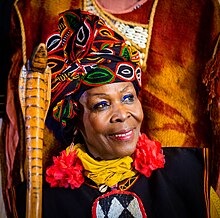Werewere Liking
Werewere Liking | |
|---|---|
 | |
| Born | 1950 |
| Nationality | Cameroonian |
| Occupation(s) | stage performer, writer |
| Awards | Prince Claus Award in 2000 |
Werewere Liking (born 1950, in Cameroon) is a writer, playwright and performer based in Abidjan, Côte d'Ivoire. She established the Ki-Yi Mbock theatre troupe in 1980 and founded the Ki-Yi village in 1985 for the artistic education of young people.
Her novel Elle sera de jaspe et de corail is a song-novel recounted by an astute misovire (literally 'man-hater' from misos Gr. "hate" and vir Lat. "man") in writing a journal on nine themes as a dialectic between two men wherein the author of the journal imagines a new race of people uninhibited by the historical baggage of patriarchy and colonialism.[1] She is the author of the African feminist theory "misovirism."[2]
She received a Prince Claus Award in 2000 for her contributions to culture and society, and the Noma Award in 2005 for her book La mémoire amputée.[3]
Writing
[edit]Her books and plays include:
- La mémoire amputée, Nouvelles Editions Ivoiriennes (2004), ISBN 2-84487-236-0
- Elle sera de jaspe et de corail, Editions L'Harmattan (1983), ISBN 2-85802-329-8 - trans. Marjolijn De Jager, It shall be of jasper and coral; and, Love-across-a-hundred-lives (two novels), University Press of Virginia (2000), ISBN 0-8139-1942-8
- La puissance de Um (1979) and Une nouvelle terre (1980) - trans. Jeanne Dingome, African Ritual Theatre: The Power of Um and a New Earth, International Scholars Pubs. (1997), ISBN 1-57309-066-2
Further reading
[edit]- Simon Gikandi, Encyclopedia of African Literature, Routledge (2002), ISBN 0-415-23019-5 - pp. 288–9
- Katheryn Wright, Extending generic boundaries: Werewere Liking's L'amour-cent-vies, in Research in African Literatures, June 2002 accessed at [1] March 5, 2007
- Don Rubin, World Encyclopedia of Contemporary Theatre: Africa, Routledge (2000), ISBN 0-415-22746-1
- Nicki Hitchcott, Women Writers in Francophone Africa, Berg Publishers (2000), ISBN 1-85973-346-8 - focuses on Mariama Bâ, Aminata Sow Fall, Werewere Liking and Calixthe Beyala: see publisher's details [2]
- Peter Hawkins, Werewere Liking at the Villa Ki-Yi, in African Affairs, Vol.90, No.359 (Apr. 1991), pp. 207–222 - accessed at [3] March 1, 2007
- Kaboré, André. "Orature as a Characteristic of the Literatures of Werewere-Liking and Pacéré." International Journal on Studies in English Language and Literature (IJSELL) 2, no. 4 (2014): 13-30.
Notes
[edit]- ^ Mielle, Michael (2000). "Werewere Liking and Aesthetics of Necessity". Contemporary Postcolonial & Postimperial Literature in English. Archived from the original on 2021-06-12. Retrieved 2024-06-02.
- ^ Zabus, Chantal J. (2013). Out in Africa: Same-sex Desire in Sub-Saharan Literatures & Cultures. Boydell & Brewer Ltd. p. 148. ISBN 978-1-84701-082-7.
- ^ "Noma Award 2005". Archived from the original on 2007-03-04. Retrieved 2007-03-01.
External links
[edit]- Ivorian dramatists and playwrights
- Cameroonian actresses
- Cameroonian dramatists and playwrights
- Women dramatists and playwrights
- 1950 births
- Living people
- Ivorian women writers
- Cameroonian women writers
- Ivorian actresses
- Ivorian novelists
- Cameroonian novelists
- 20th-century novelists
- 20th-century actresses
- 20th-century dramatists and playwrights
- 21st-century novelists
- 21st-century actresses
- 21st-century dramatists and playwrights
- People from Abidjan
- 20th-century Cameroonian writers
- 20th-century Cameroonian women writers
- 21st-century Cameroonian writers
- 21st-century Cameroonian women writers
- Bassa people (Cameroon)
